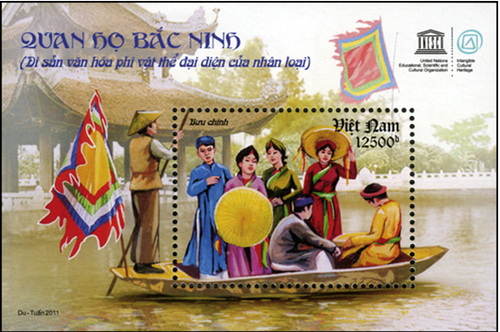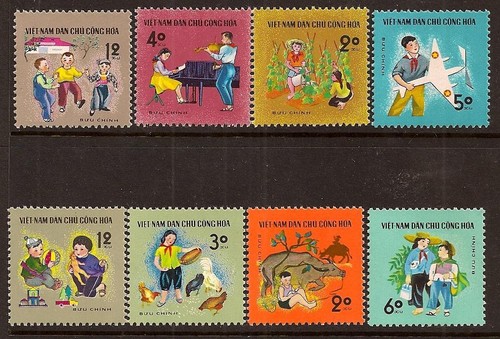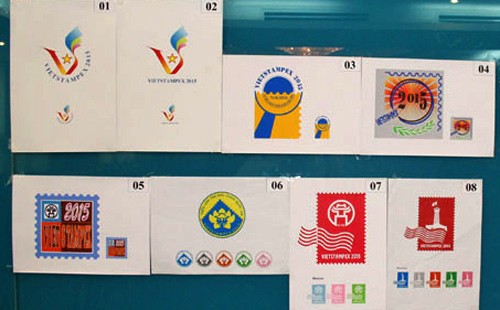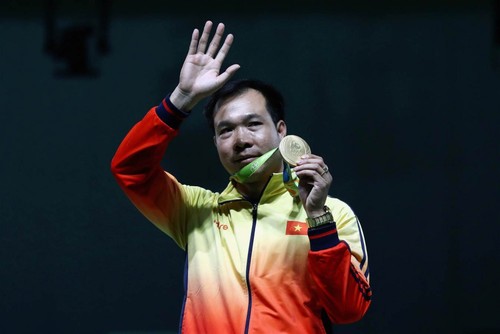Hello and welcome to VOV’s Letter Box, a weekly feature dedicated to our listeners throughout the world. We are Mai Phuong and Phuong Khanh.
A: Over the past few weeks, we have received a lot of reception reports commenting on the frequency quality of VOV broadcasts. As we have mentioned in our previous programs, VOV is making some frequency changes as it has revised its shortwave frequencies and broadcasting times.
B: We have stopped broadcasting our program on the frequency of 12005 khz from 1h-1h30 UTC and on 9625 khz from 0h-0h30 UTC. On the frequency of 6175 khz we’ll add broadcasts at 0h-0h30 UTC and 1h00-1h30 UTC.

Stamp collection depict Vietnam's cultural heritages |
A: On the frequency of 9730 khz and 7280 khz our programs will be available at 19h-19h30 UTC and 21h30-22h UTC. If you missed this information, please go to our website at vovworld.vn to check it again. We’ll also send you letters and emails to inform you of the changes. We hope to receive your technical feedback on reception quality very soon.
B: Richard Nowak is one of many listeners who sent us regular reception reports. Listening to our broadcast on August 11th at 1:00 UTC on the frequency of 12005, he reported a good reception with SINPO of 45344. But for the program two days later on August 13, he wrote: “I enjoyed tonight’s show. The signal was very good. The audio went out often towards the end. The news came in decent with the audio going silent a minor amount of times. I was going to make a video of the first song around 1:24 but the audio went silent 5 times”.
A: Thank you very much, Richard, for your detailed report, which is very helpful for us. Christer Brunstrom of Sweden listened to VOV on August 6 at 17:00 on the frequency of 9625. He wrote: “Reception was strong and clear. SINPO was 45444. However, there was an annoying problem consisting of frequent short breaks in the programming probably due to problems in the feed from Vietnam to the transmitting station in Europe. I have noted this problem before but yesterday, there were more breaks than usual. Each break lasts some five to ten seconds and then the program feed starts again”.

Photo: cuahangtemsach.com |
B: Christer, thank you very much for your informative report. We’ll forward it to our technician. Also in his email, Christer told us about the Hallfrim 2016 Stamp Show in Halmstad, which is a 3-day national stamp and picture postcard exhibition.
A: Christer also asked whether stamp clubs in Vietnam stage stamp exhibitions and about the state of stamp collection in Vietnam.
B: Every five years, the Ministry of Culture, Sports and Tourism, the Vietnam postal service and the Viet Stamp Club jointly organize the Vietnam Stamp Exhibition (Vietstampex) as a place for philatelists to share their collections and select entrants for regional and global stamp contests. Last year, the event drew the participation of thousands of stamp enthusiasts.

Stamp collections displayed at Vietstampex 2015 |
A: Vietstampex 2015 had on display over 500 postage stamp collections depicting Vietnamese culture and traditions. The exhibition celebrated some big events in Vietnam like the advent of the ASEAN Community on December 31. This year marks a particular success for the Vietnamese postal sector: two Vietnamese artists were declared the winners of a stamp and postmark contest in Thailand. Their stamps will be issued by all ten members of the ASEAN community”.
B: Many stamps and postcards on display this year date back to the 1880s and 90s. Each collection represents the efforts and enthusiasm of a philatelist over a long period of time, researching, collecting, and preserving.
A: Vietstampex 2015 gives philatelists an opportunity to share their whole life’s work and to learn from their seniors. Their collections receive feedback from the judges and the philately community. The participation of stamp experts, whose collections have won many prizes worldwide was an inspiration to younger philatelists. It was a sharing of knowledge and rare items they might never have seen in their life, which brings them closer to the peak of stamp collecting.
B: Collecting stamps involves hundreds of millions of people globally. In Vietnam, too, stamp collecting has become one of the most-enjoyed hobbies. The hobby began more than 100 years ago in the developed postal sector of England. At that time, mail recipients had to pay for the delivery, which caused many problems. Rowland Hill, a British reformer, created the world’s first stamp in 1840. Since then, anyone who wanted to send a letter had to buy a postage stamp and stick it on the envelope.
A: Soon after adhesive postage stamps were introduced in England, the stamp collecting hobby was created and spread to other European countries, and then those countries began to publish their own stamps. Twenty years later, stamps were appearing in countries all around the world. Stamp collecting arrived in Vietnam quite late, but the hobby has been popular here for over half a century.
B: That’s a short take on stamp collecting and exhibiting in Vietnam. Next is a letter from Ashik Eqbal Tokon of Bangladesh. Ashik listened to our broadcast on August 10 and asked about the shooting movement in Vietnam after listening to our story about marksman Hoang Xuan Vinh, who won a gold and a silver medal at Rio Olympic 2016.
A: Shooting began as a sport in Vietnam in the early 1960s with the first shooters being members of the army and railway sector. At that time, the marksmen practiced with rifles like the Bruno - 2, Bruno - 4, Toz – 8, and Drulov…
B: From 1963 to 1969, international standard shooting sports were widely popularized throughout the north. Annual National Shooting Games were organized under two categories: Advanced Shooting and Popular Shooting competitions. The number of shooting athletes and practitioners increased in all localities and sectors and their achievements increased rapidly. Many of them reached the standards of other professional marksmen.
A: The interest in shooting sports reduced during early 1970s due to a number of differences of opinions and the dissolutions of both the Defense Sports Department and the Central Shooting Club.
B: Since 1973, shooting has risen up in particularly as a sport. Shooting became one of Vietnam’s key sports, especially as one of Vietnam’s medal earners at international sports competitions. The number of marksmen has increased, especially in the major cities.

Shooter Hoang Xuan Vinh wins a gold and a silver medal at Rio Olympic 2016 |
A: The 2nd National Shooting Sports Congress was convened in 1994 where the Vietnam Shooting Federation was set up. Vietnam’s achievements in shooting have improved. Marksman Hoang Xuan Vinh made history for Vietnam’s sports scene after winning gold and silver medals in the Rio Olympics 2016.
B: Hoang Xuan Vinh was the first Vietnamese athlete to win a gold medal in Olympic. Vietnam’s first Olympic medal winner was Tran Hieu Ngan, a Vietnamese Taekwondo athlet who competed in the women’s 49 to 57 kg weight class at the 200 Summer Olympics and won a silver medal. Weightlifter Tran Anh Tuan won a silver medal for 56 kg category at Beijing Olympic 2008
A: With this story, we hope that Ashik Eqbal Tokon of Bangladesh and Rachid Dahmani could learn more about Vietnam’s sports. In today’s program, we’d like to welcome Kosai Genki, who might be the youngest listeners of VOV English program. He is 14 years old from Hyogo, Japan. In his letter to VOV this week, he reported listening to VOV broadcast from 11:30 to 11:40 on July 31st and rated SINPO at 55444.
B: Thank you Kosai Genki for your report. We’ll send you a QSL card to confirm it. We hope to hear more from you. We’d like to acknowledge emails and letters from Stanisla Barabash of Ukraine, Sekar Thalainayar, Jayanta Chakrabarty, Soutik Hati, and Bhaikan Hazarika of India, Staffan Crona of Sweden, Ullmar Qvick, David Ansell of the UK, Mohammad Aslam, (Aslam khan), Andy Martynyuk of Russia, Richard lemke of Canada, and Tim Breyel of Malaysia. We’ll send you all QSL cards to confirm your reports.
A: We welcome your feedback at: English section, VOVworld, Radio Voice of Vietnam, 45 Ba Trieu Street, Hanoi, Vietnam. You can email us at: englishsection@vov.org.vn. You’re welcome to visit us online at www.vovworld.vn, where you can hear both live and recorded programs. Good bye until next time.